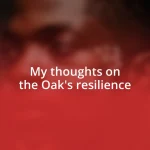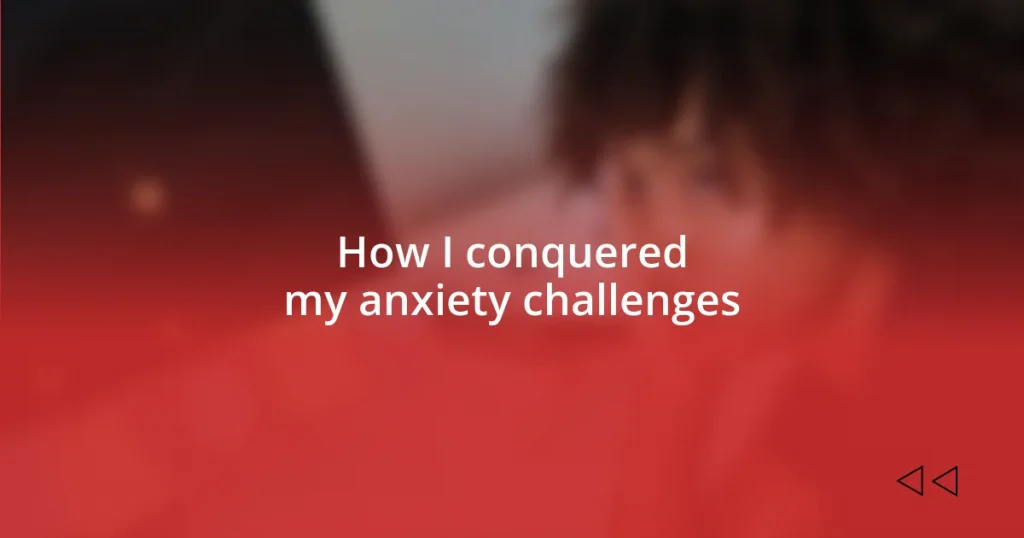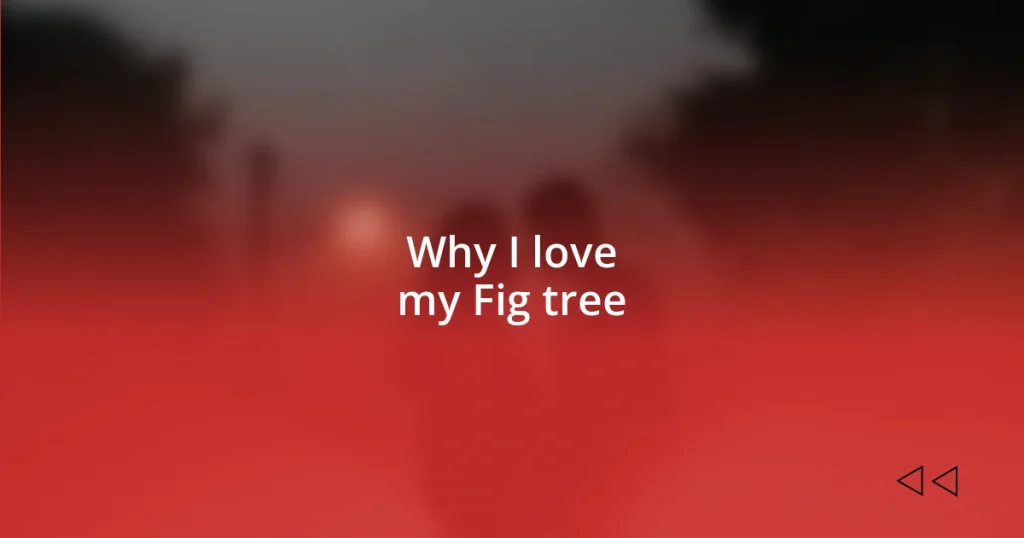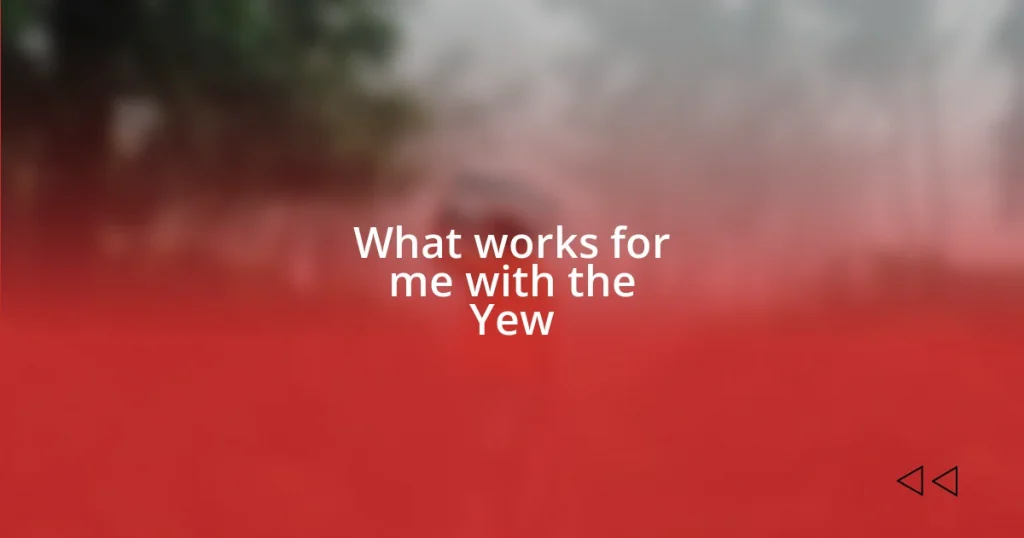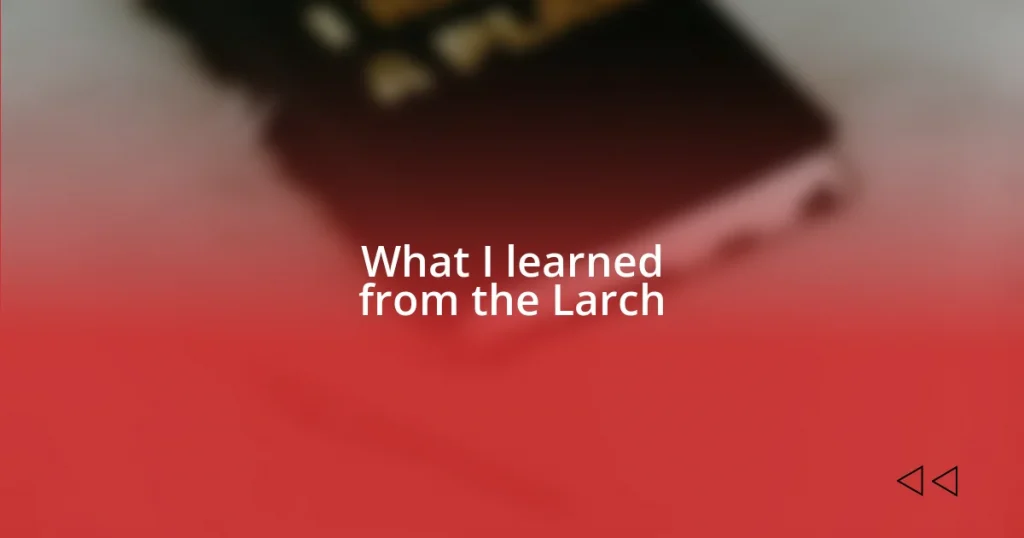Key takeaways:
- Identifying anxiety triggers, such as social situations and work pressure, is crucial for managing anxiety and preparing for challenging scenarios.
- Developing coping strategies, including mindful breathing and journaling, can help regain control and reduce anxiety during overwhelming moments.
- Building a support system and celebrating small victories fosters resilience and encourages positive growth throughout the journey of overcoming anxiety.
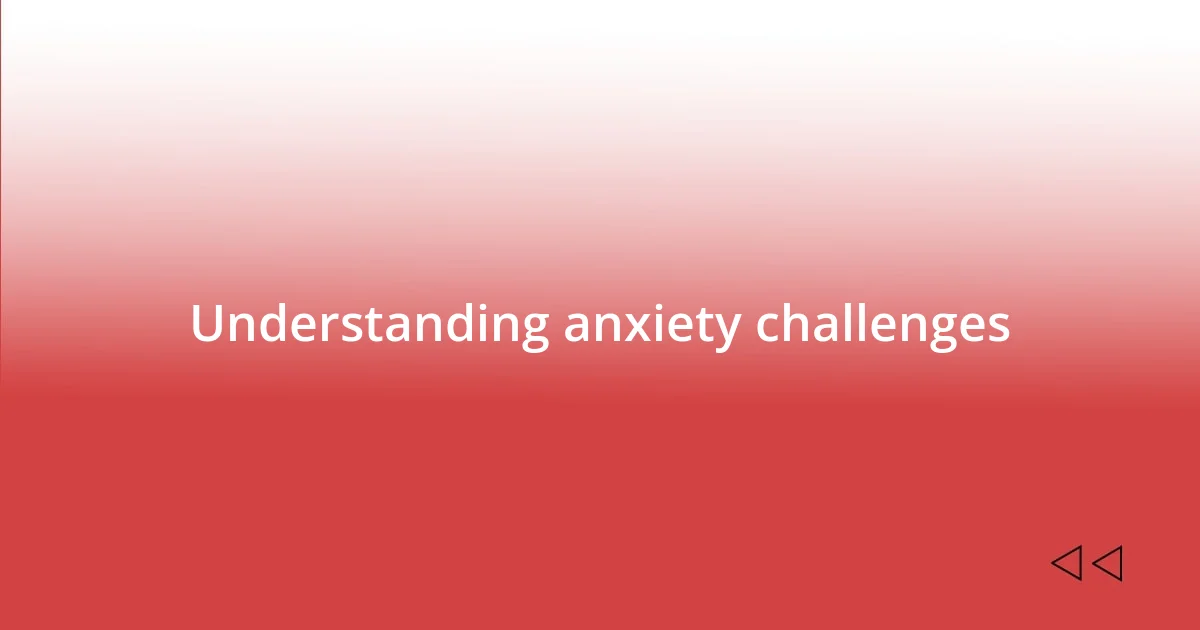
Understanding anxiety challenges
Anxiety challenges can feel like an overwhelming fog that creeps in unexpectedly, influencing everything from relationships to daily decisions. I’ve faced moments when the simplest tasks, like making a phone call or attending an event, felt insurmountable. Have you ever sat in silence, feeling your heart race, wishing you could just breathe and ease the tension gripping your chest?
I remember a time I stood outside a social gathering, torn between the desire to join my friends and the paralyzing fear of judgment. That moment exposed how anxiety could manipulate reality, turning friendly faces into potential critics. I often wonder, how many others have felt that same push-and-pull between connection and fear?
Understanding anxiety means recognizing it as more than just a feeling; it’s a complex interplay of thoughts, beliefs, and experiences. I’d find myself questioning whether my feelings were valid or if I simply needed to “toughen up.” Yet, it’s essential to realize that grappling with anxiety isn’t a sign of weakness—it’s a profound testament to being human.
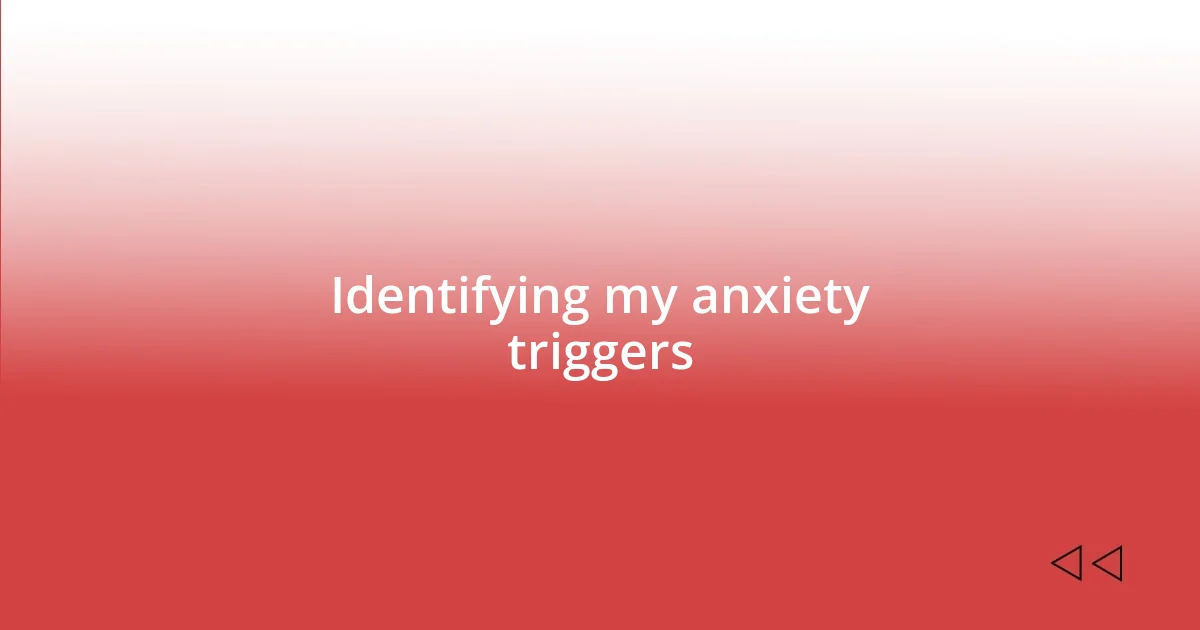
Identifying my anxiety triggers
Identifying the things that trigger my anxiety has been a critical step in managing it. I remember a particularly stressful week where I had back-to-back meetings scheduled, and as the days wore on, I would begin feeling nauseous just thinking about them. It became clear to me that my triggers weren’t just the events themselves but the anticipation and pressure I placed on those situations.
In my journey, I learned to pinpoint environmental triggers as well. Entering crowded spaces or being in close proximity to strangers would send a jolt of anxiety through me. Reflection helped me understand the power of my thoughts during those moments. I often found myself thinking, “What if everyone notices how nervous I am?” This realization forged the path toward recognizing that those anxious thoughts needed to be challenged rather than assumed as true.
Creating a list of my anxiety triggers was immensely helpful. I divided them into different categories, such as social settings, work scenarios, or even certain conversations. It may sound simple, but writing it down helped crystallize those feelings for me. Each trigger became a point of analysis; I would ask myself how I could cope or prepare for each scenario, gradually taking away some of the unknowns that fueled my anxiety.
| Trigger Type | Examples |
|---|---|
| Social | Parties, large gatherings, meeting new people |
| Professional | Work presentations, tight deadlines, office politics |
| Environmental | Crowded places, noisy settings, unfamiliar locations |
| Situational | Receiving feedback, having difficult conversations, unexpected changes |
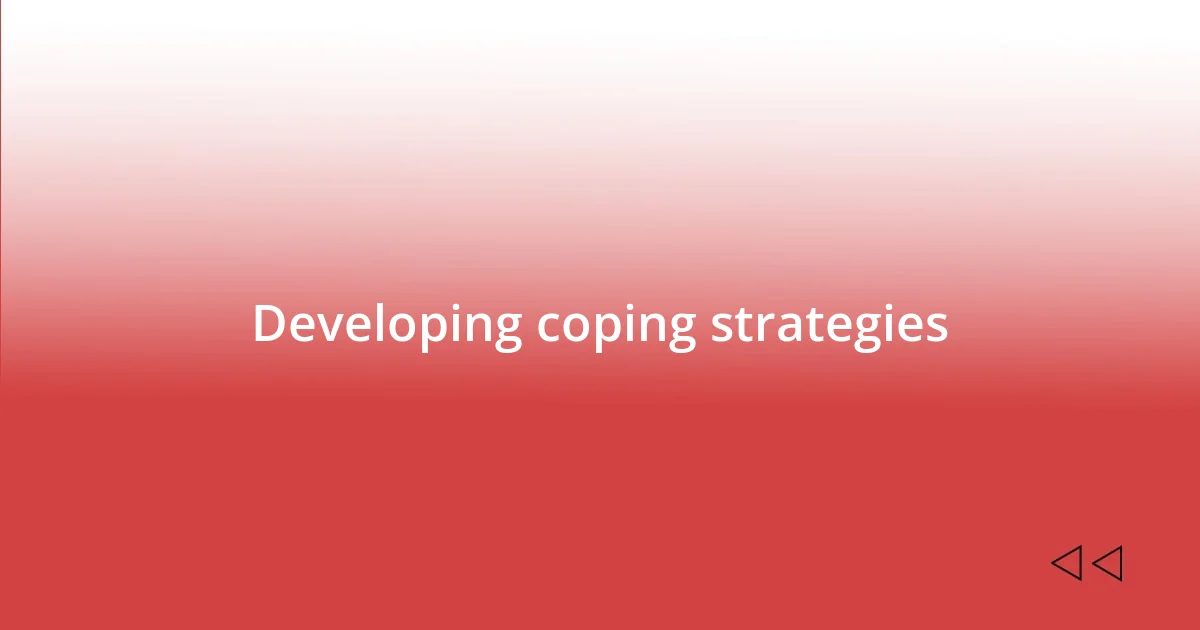
Developing coping strategies
Developing coping strategies for my anxiety was an essential part of my journey. I found that having specific tools at my disposal helped me regain a sense of control, especially during those overwhelming moments. For example, I started practicing deep breathing exercises. In high-stress situations, a few slow, intentional breaths grounded me. These moments of quiet allowed me to recenter my thoughts and ease the physical effects of anxiety that were often so fierce.
- **Mindful Breathing:** Focusing on each breath to bring my attention away from anxious thoughts.
- **Positive Affirmations:** I created a list of empowering statements that reminded me of my strength and capabilities.
- **Physical Activity:** Engaging in short bursts of exercise, like a brisk walk, complete with the rush of endorphins that helped lift my mood.
- **Journaling:** Writing down my thoughts helped me process emotions and clarify my feelings, making it easier to identify patterns.
- **Grounding Techniques:** Whenever I felt overwhelmed, I would engage my senses by describing five things I could see, four I could touch, three I could hear, two I could smell, and one I could taste.
There was one afternoon when I felt a wave of anxiety crashing over me before an important meeting. I remembered my grounding technique, took a moment to settle down, and noticed a pen with a vibrant color on my desk. Focusing on it—the way the light reflected off its surface, its smoothness in my hand—grounded me and shifted my perspective. Instead of viewing the meeting as a daunting challenge, I approached it as an opportunity to connect. Finding these strategies has made such a difference in my life.
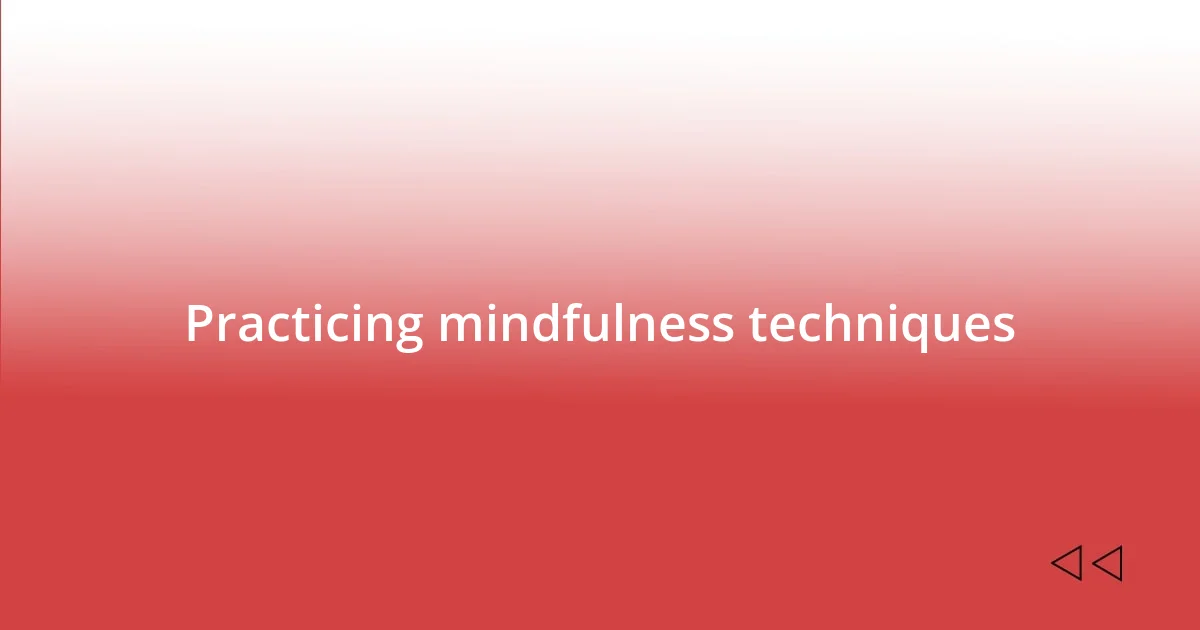
Practicing mindfulness techniques
Practicing mindfulness techniques has genuinely transformed my relationship with anxiety. One particularly eye-opening experience was when I decided to incorporate meditation into my daily routine. I started with just five minutes a day, focusing on my breath. It felt strange at first, but as I settled into the rhythm, I began to notice the little thoughts that would flit in and out of my mind, like a busy sky filled with clouds. This realization was liberating; it taught me that I wasn’t my thoughts. I could observe them without judgment. How many of us feel overwhelmed by our racing thoughts, thinking they’re a reflection of who we are?
As I grew more comfortable with meditation, I began exploring mindful walking. There’s something extraordinary about the simple act of placing one foot in front of the other, especially when I place my focus on each step. I vividly remember an evening stroll where I took the time to admire the rustling leaves, the feeling of solid ground beneath my feet, and the cool breeze brushing my face. This practice turned what could have been a repetitive routine into a deeply grounding experience. It made me realize that sometimes, the antidote to anxiety lies in the act of simply being present in the moment.
Another mindfulness technique that has proven invaluable is guided imagery. I recall a particularly anxious night when I couldn’t sleep. Instead of tossing and turning, I closed my eyes and envisioned a peaceful beach. I could almost hear the gentle waves and feel the warmth of the sun. Immersing myself in that mental sanctuary calmed my racing heart and allowed me to drift into a restorative sleep. It’s fascinating how our imagination can serve as a refuge; I often wonder—could harnessing our thoughts in this way gradually rebuild our confidence against anxiety’s relentless tide?
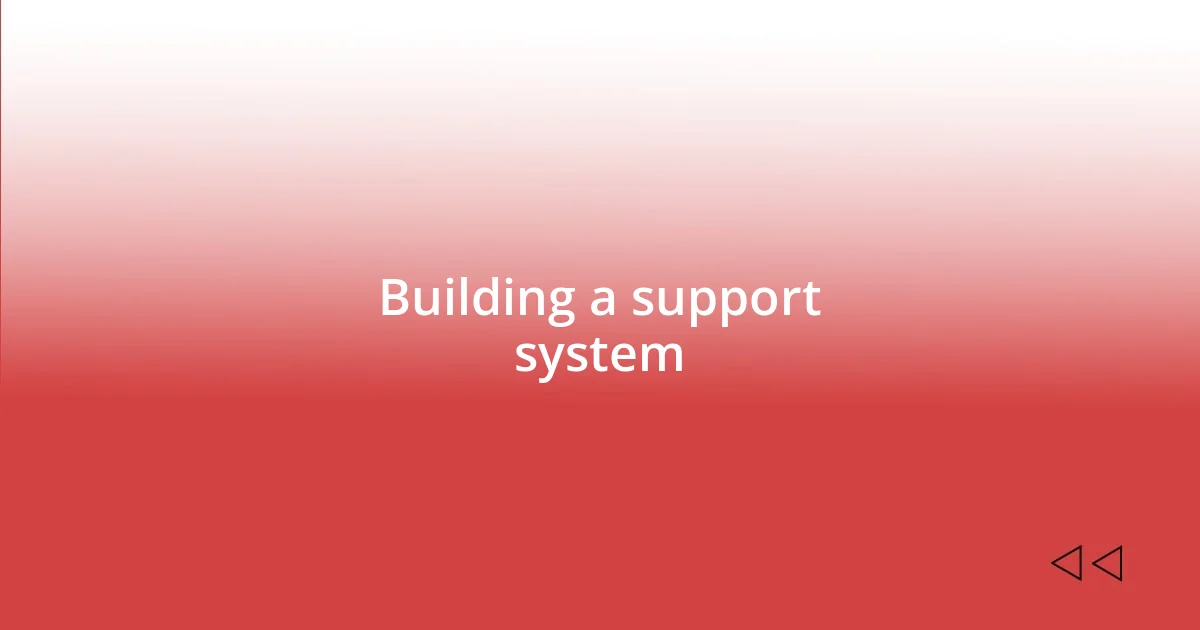
Building a support system
Building a support system was a game changer for me in my battle with anxiety. Initially, I was hesitant to reach out, thinking I could navigate my challenges alone. But then I realized that sharing my feelings not only lightened my emotional load, but also helped me to connect with others who understood exactly what I was experiencing. Have you ever found solace in simply knowing someone else is in your corner?
I vividly remember the first time I opened up to a close friend about my struggles. Her immediate response of empathy and understanding was comforting. It struck me how reassuring it felt to have someone listen without judgment. This pivotal moment inspired me to seek out a supportive circle, including relatives and online communities, where I found people sharing similar experiences. I often ask myself, how many comforting connections are out there just waiting to be formed?
Creating a solid support system isn’t only about sharing problems; it’s about building relationships that foster positivity and encourage growth. I learned the importance of surrounding myself with people who uplifted me, those who could share in my victories—big or small. For example, when I managed to confront a situation that typically triggered my anxiety, the enthusiasm from my support group made me feel celebrated. Reflecting on those moments, I can’t help but think: isn’t it incredible how our connections shape our resilience?
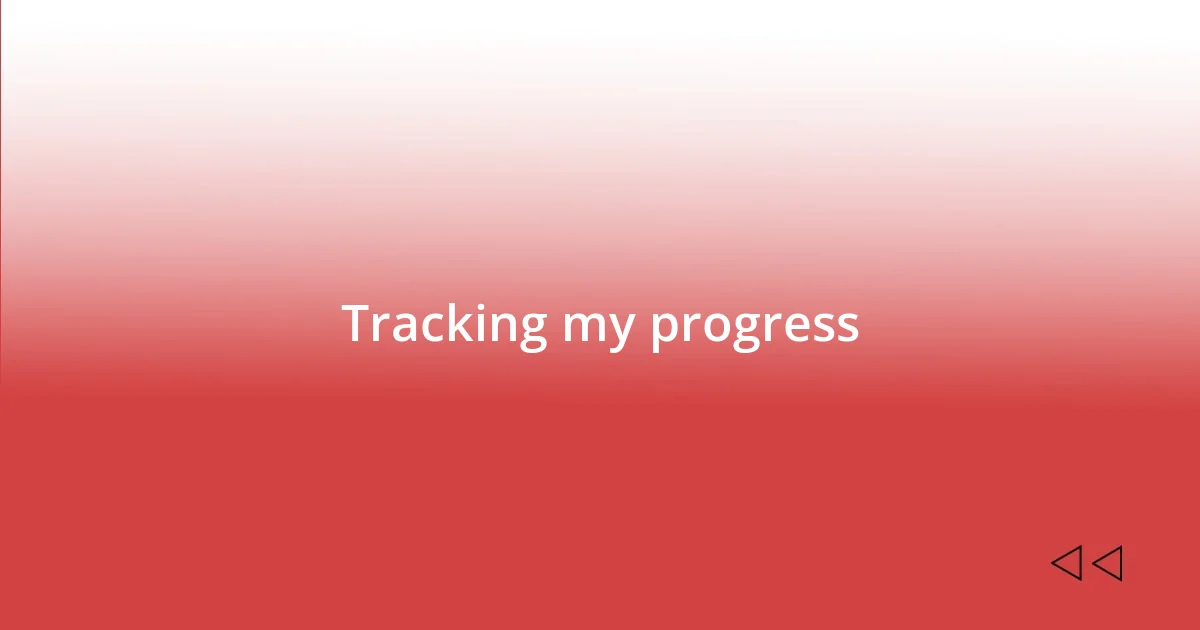
Tracking my progress
Tracking my progress has been an essential tool in my journey through anxiety. I remember setting up a simple journal where I could jot down my daily experiences, emotions, and coping strategies. At first, it felt a bit tedious, but over time, flipping through those pages revealed so much about my growth. I couldn’t believe how far I had come! Have you ever looked back at your past struggles and felt proud?
One particularly eye-catching entry described a day when anxiety hit me hard. Instead of succumbing to it, I wrote about using the breathing techniques I had been practicing. That day marked a shift in my mindset; I realized I could navigate my emotions rather than be overwhelmed by them. Looking back on those moments now fills me with gratitude and hope. How powerful it is to put thoughts on paper and see a transformation unfold right before your eyes!
Moreover, I started tracking certain metrics, like my sleep patterns and triggers, which provided amazing insights into what worked and what didn’t. I once discovered that nights when I practiced gratitude before bed led to deeper, more restful sleep. The act of tracking brought clarity to my experiences; I learned that being mindful of my triggers allowed me to prepare better and respond effectively. Have you ever pondered how simple observations can shape your path forward? That realization made all the difference for me.
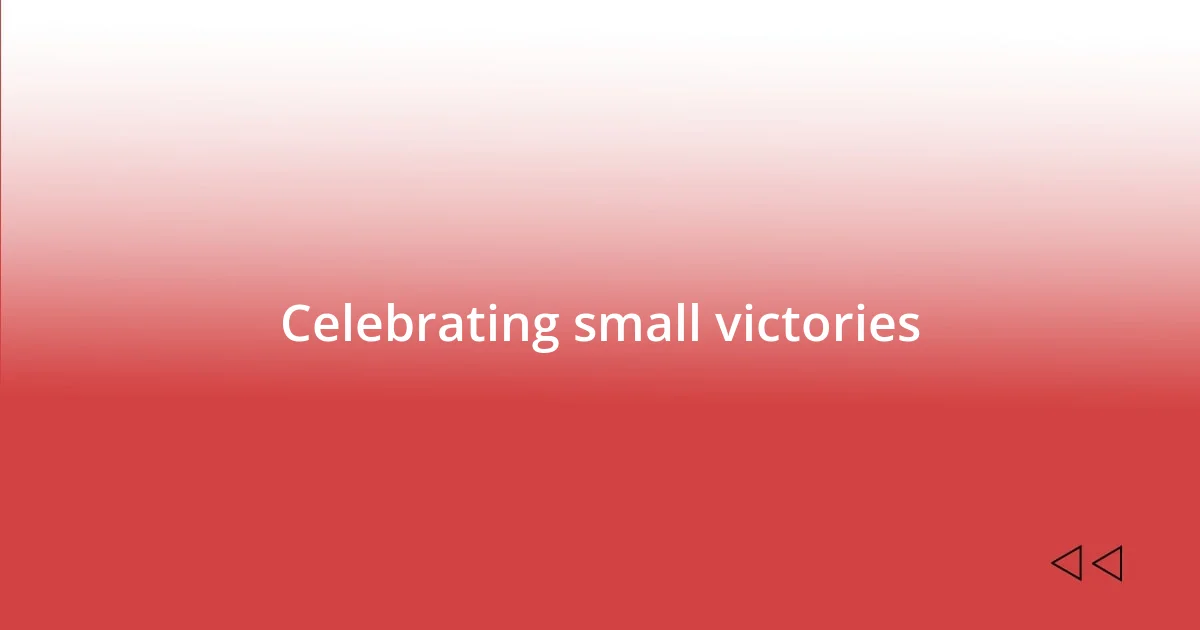
Celebrating small victories
Celebrating small victories became a vital part of my journey with anxiety, and it’s one of the most rewarding practices I embraced. I remember the day I managed to attend a social gathering that used to fill me with dread. Afterward, I felt an exhilarating mix of pride and relief wash over me, and it hit me: even the tiniest steps deserve recognition. Have you ever felt that rush after accomplishing something you once thought was impossible?
One evening, I treated myself to my favorite dessert as a reward for successfully completing a week of daily meditation—a feat that felt monumental at the time. Little did I realize, savoring that moment not only reinforced my positive behavior but also added a sweet layer to my overall experience. It’s funny how simple acts of kindness towards ourselves can uplift our spirits. Don’t you think we often underestimate the power of celebrating our own progress?
Each time I faced a challenge, I learned to pause and acknowledge my efforts. A personal favorite was sharing these moments with my support system, who would cheer me on like I had just won a marathon! Their enthusiasm made my victories feel even more valid. In moments of doubt, I would remind myself: this journey isn’t a race, and every small victory is a step worth celebrating. Isn’t it amazing how those little wins can ignite a sense of hope and motivation? I truly believe they are the building blocks that help us conquer larger challenges.






